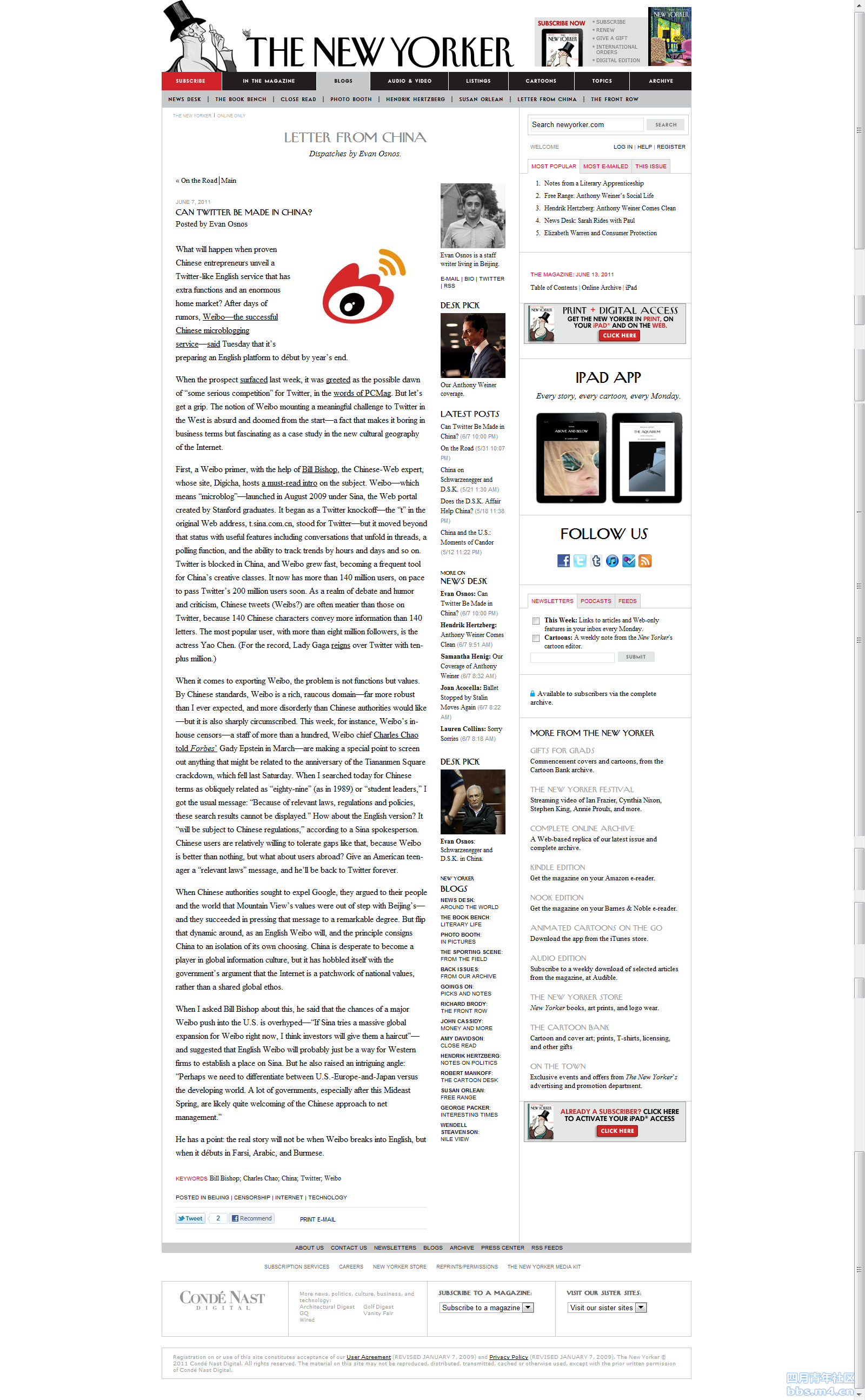|
|
LETTER FROM CHINA
Dispatches by Evan Osnos.
JUNE 7, 2011
CAN TWITTER BE MADE IN CHINA?
Posted by Evan Osnos
What will happen when proven Chinese entrepreneurs unveil a Twitter-like English service that has extra functions and an enormous home market? After days of rumors, Weibo—the successful Chinese microblogging service—said Tuesday that it’s preparing an English platform to début by year’s end.
When the prospect surfaced last week, it was greeted as the possible dawn of “some serious competition” for Twitter, in the words of PCMag. But let’s get a grip. The notion of Weibo mounting a meaningful challenge to Twitter in the West is absurd and doomed from the start—a fact that makes it boring in business terms but fascinating as a case study in the new cultural geography of the Internet.
First, a Weibo primer, with the help of Bill Bishop, the Chinese-Web expert, whose site, Digicha, hosts a must-read intro on the subject. Weibo—which means “microblog”—launched in August 2009 under Sina, the Web portal created by Stanford graduates. It began as a Twitter knockoff—the “t” in the original Web address, t.sina.com.cn, stood for Twitter—but it moved beyond that status with useful features including conversations that unfold in threads, a polling function, and the ability to track trends by hours and days and so on. Twitter is blocked in China, and Weibo grew fast, becoming a frequent tool for China’s creative classes. It now has more than 140 million users, on pace to pass Twitter’s 200 million users soon. As a realm of debate and humor and criticism, Chinese tweets (Weibs?) are often meatier than those on Twitter, because 140 Chinese characters convey more information than 140 letters. The most popular user, with more than eight million followers, is the actress Yao Chen. (For the record, Lady Gaga reigns over Twitter with ten-plus million.)
When it comes to exporting Weibo, the problem is not functions but values. By Chinese standards, Weibo is a rich, raucous domain—far more robust than I ever expected, and more disorderly than Chinese authorities would like—but it is also sharply circumscribed. This week, for instance, Weibo’s in-house censors—a staff of more than a hundred, Weibo chief Charles Chao told Forbes’ Gady Epstein in March—are making a special point to screen out anything that might be related to the anniversary of the Tiananmen Square crackdown, which fell last Saturday. When I searched today for Chinese terms as obliquely related as “eighty-nine” (as in 1989) or “student leaders,” I got the usual message: “Because of relevant laws, regulations and policies, these search results cannot be displayed.” How about the English version? It “will be subject to Chinese regulations,” according to a Sina spokesperson. Chinese users are relatively willing to tolerate gaps like that, because Weibo is better than nothing, but what about users abroad? Give an American teen-ager a “relevant laws” message, and he’ll be back to Twitter forever.
When Chinese authorities sought to expel Google, they argued to their people and the world that Mountain View’s values were out of step with Beijing’s—and they succeeded in pressing that message to a remarkable degree. But flip that dynamic around, as an English Weibo will, and the principle consigns China to an isolation of its own choosing. China is desperate to become a player in global information culture, but it has hobbled itself with the government’s argument that the Internet is a patchwork of national values, rather than a shared global ethos.
When I asked Bill Bishop about this, he said that the chances of a major Weibo push into the U.S. is overhyped—“If Sina tries a massive global expansion for Weibo right now, I think investors will give them a haircut”—and suggested that English Weibo will probably just be a way for Western firms to establish a place on Sina. But he also raised an intriguing angle: “Perhaps we need to differentiate between U.S.-Europe-and-Japan versus the developing world. A lot of governments, especially after this Mideast Spring, are likely quite welcoming of the Chinese approach to net management.”
He has a point: the real story will not be when Weibo breaks into English, but when it débuts in Farsi, Arabic, and Burmese.
http://www.newyorker.com/online/ ... -made-in-china.html

|
Chinese, English, Home, Twitter, Chinese, English, Home, Twitter, Chinese, English, Home, Twitter
评分
-
1
查看全部评分
-
|